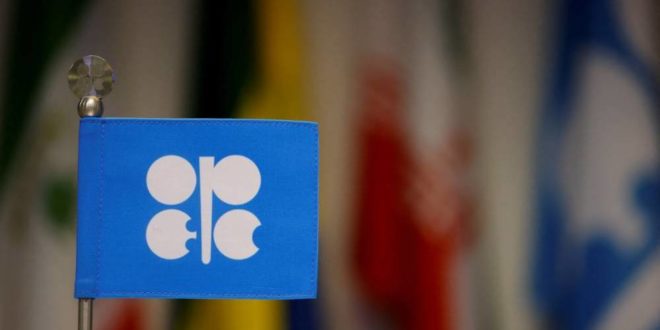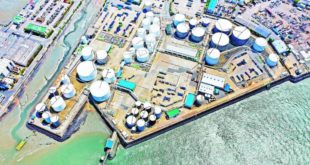Participants in the 48th meeting of the Joint Ministerial Committee to Monitor Production of Member States of the Organization of the Petroleum Exporting Countries and outside it «OPEC +», which was held, Monday, via video conference, confirmed that the voluntary oil production reduction of 9 countries by 1.66 million barrels per day, starting next May, is A precautionary measure aimed at supporting the stability of the oil market.
They also reaffirmed their commitment to the declaration of cooperation, which extends until the end of the current year 2023, as decided at the thirty-third ministerial meeting of OPEC and non-OPEC members held on October 5, 2022, and urged all participating countries to achieve full compliance and adhere to the compensation mechanism.
The committee reviewed crude oil production data for the months of January and February 2023 and noted the total compliance with OPEC + countries, while the committee referred to the voluntary production cut announced by Saudi Arabia by 500,000 barrels per day, Iraq by 211,000 barrels, and the UAE by 144,000 barrels. , Kuwait with 128 thousand barrels, Kazakhstan with 78 thousand barrels per day, Algeria with 48 thousand barrels, Oman with 40 thousand barrels, Gabon with 8 thousand barrels, and Russia with 500 thousand barrels per day, from May until the end of 2023, in addition to The production adjustments that were determined at the thirty-third ministerial meeting of «OPEC +».
The 49th meeting of the Joint Ministerial Committee to Monitor Production is scheduled to be held next June.
Rising prices
Oil prices rose on Monday, in the wake of the sudden announcement of a significant production cut, starting in May, with the aim of raising prices after their recent decline.
Ibrahim Al-Ghitani, an energy expert residing in Abu Dhabi, indicated that the voluntary cuts “come after Brent crude prices reached their lowest levels in two years last March, due to the crisis of some US banks.”
And Agence France-Presse reported that “the Brent price drop to less than $80 is an unacceptable level for OPEC Plus members,” noting that “producing countries adhere to a balancing level that supports their large financial budgets this year and their next economic plans.”
Analysts and traders said that the sudden new production cuts in the targets of the OPEC + group may push oil prices towards $ 100 a barrel, paving the way for another clash with the West, which is struggling to raise interest rates.
Indeed, after the “OPEC +” decision, the market raised the probability of a Fed rate hike by a quarter point in May to 61%, from 48% on Friday, and 38 basis points of cuts were priced in by the end of the year.
White House: Cuts are not recommended due to market uncertainty
A White House official said that US officials had been informed of OPEC’s intention to cut oil production before Sunday’s announcement, but they did not know the reason for the decision.
“We received an alert,” John Kirby, strategic communications coordinator at the National Security Council, told reporters.
In response to a question about reports that the cuts were related to the failure of the United States to quickly refill the Strategic Petroleum Reserve, Kirby said: “I’m just saying that I can’t even speculate on why this decision was made.”
He added that cuts are not recommended given the uncertainty in the market, adding that the United States has made this clear to OPEC.
He said the White House focuses on consumers, not production volume, and will continue to work with producers and consumers to ensure growth and lower prices for consumers.
The Kremlin: The dissatisfaction of some countries is a matter of its own
The Kremlin said, on Monday, that supporting the prices of oil and petroleum products is in the interest of the global energy sector. In response to a question about the US criticism, Kremlin spokesman Dmitry Peskov told reporters: “In this case, it is in the interest of the global energy sector to maintain global prices for oil and petroleum products at the appropriate level. This is what you should focus on. Whether other countries are satisfied or not is their own business.
“It is important to keep prices at a certain level, because this sector is highly invested, and because in the foreseeable future it is not possible to meet the needs of all countries from renewable sources,” Peskov added.
When asked if Russia had coordinated its measures with «OPEC +», he said: «Russia is in constant contact with a number of countries of the OPEC + group, this is a natural process, but nothing more. In this regard, countries have an independent line, an independent interest in market stability.
International Energy Agency
The International Energy Agency said, on Monday, that the targeted oil production cuts announced by the OPEC + group “raise the risk of exacerbating market turmoil and pushing oil prices higher amid inflationary pressures, while expectations were already indicating tight supply.”
Stronger commitment
“The participation of the largest members of OPEC + indicates that commitment to production cuts may be stronger than in the past,” said Vivek Dar, an energy analyst at CPA.
He added, “This means that the oil markets may witness a contraction of approximately 1% of the global oil supply or more, starting from May.”
The head of the investment firm, Pickering Energy Partners, said on Sunday that the recent cuts could raise oil prices by $10 a barrel.
Proactive move
At this time, the Kuwait News Agency quoted the Kuwaiti Oil Minister as saying that the voluntary reduction of oil production by the countries of the OPEC + coalition came as a preemptive move to support the stability of oil markets amid rapid global developments.
The agency quoted Badr Al-Mulla as saying that these developments include the rise in global interest rates, global debt levels, the banking crisis and geopolitical developments.
For its part, the Algerian News Agency quoted the Minister of Energy and Mines, Mohamed Arkab, as saying, on Monday, that uncertainty about global economic growth may lead to a slowdown in oil demand.
Arkab added, “The oil market is being supplied very adequately, as reserves have returned
 Media ININ Economy We Trust
Media ININ Economy We Trust








